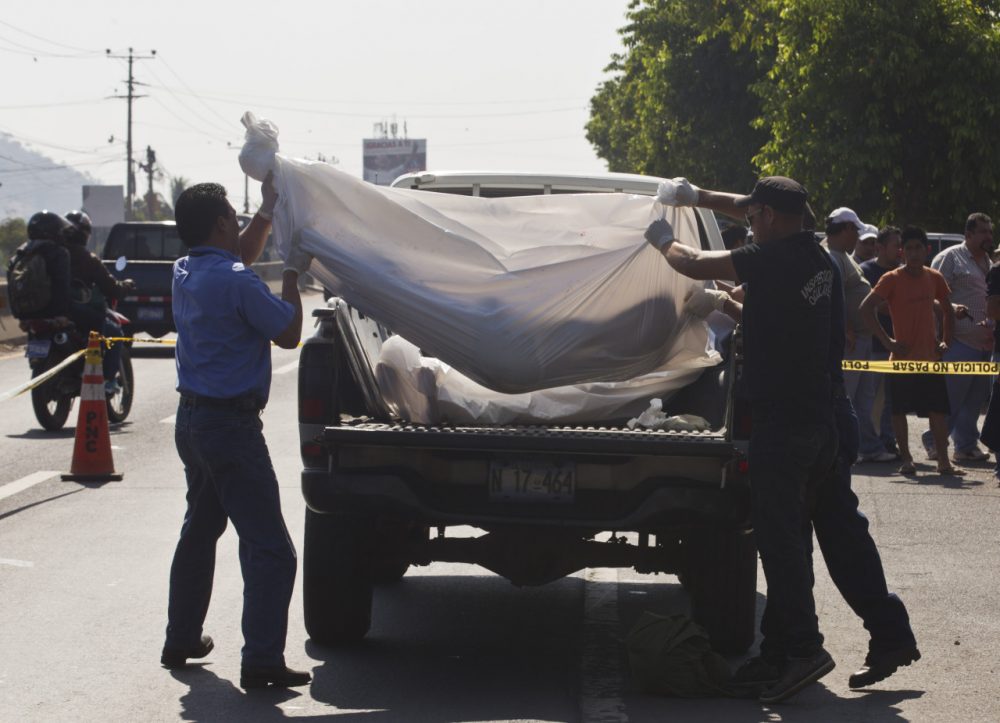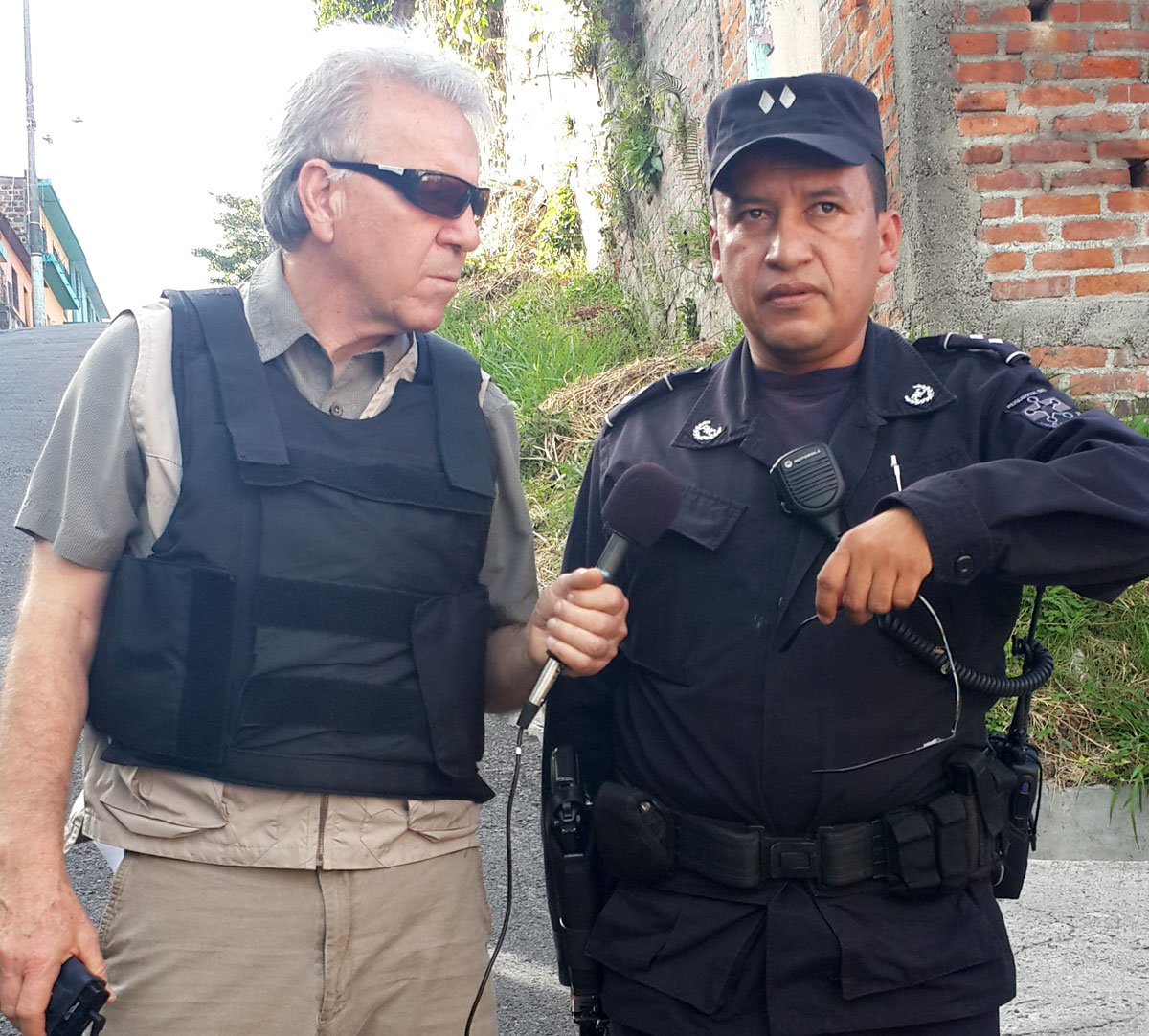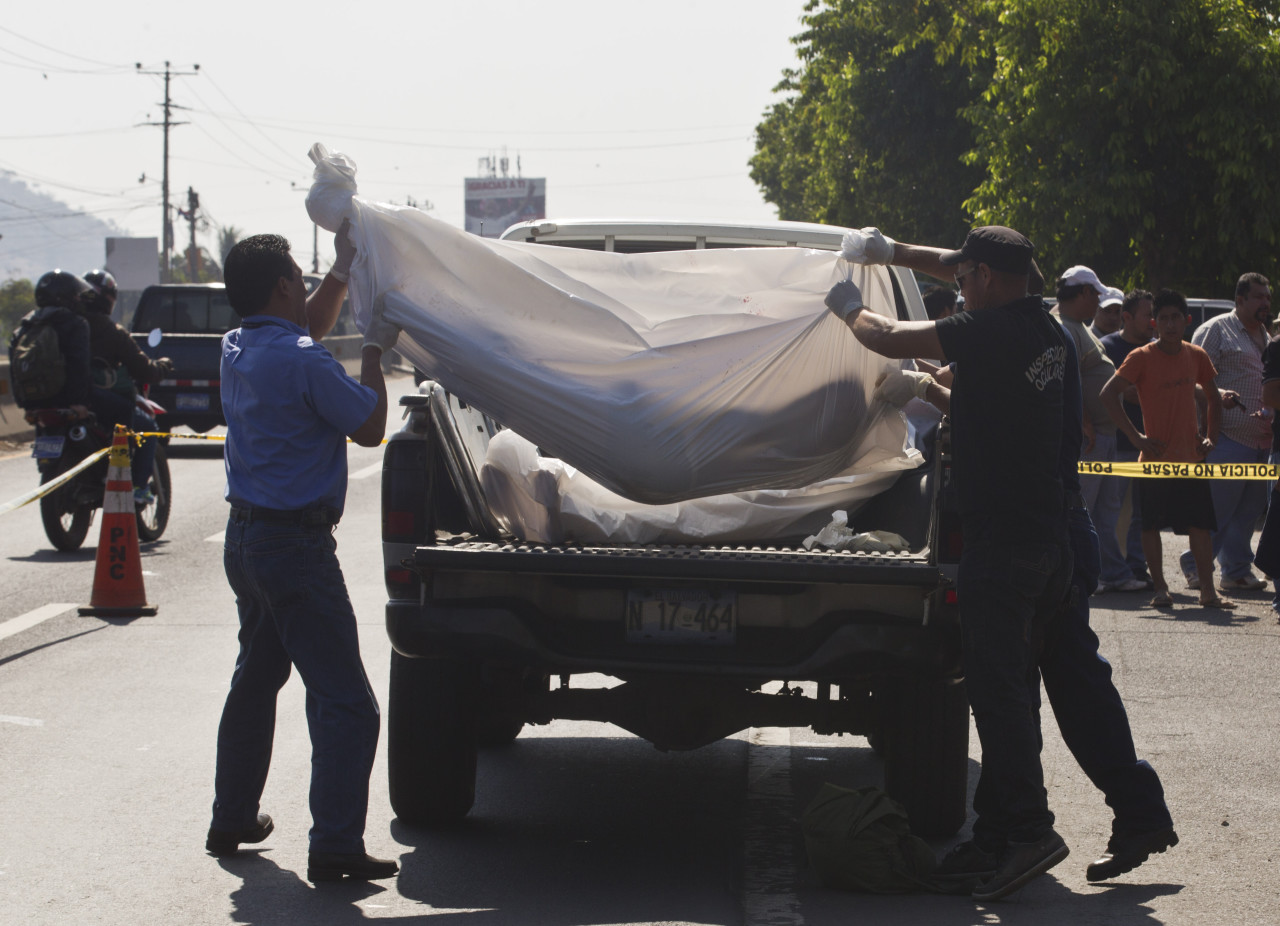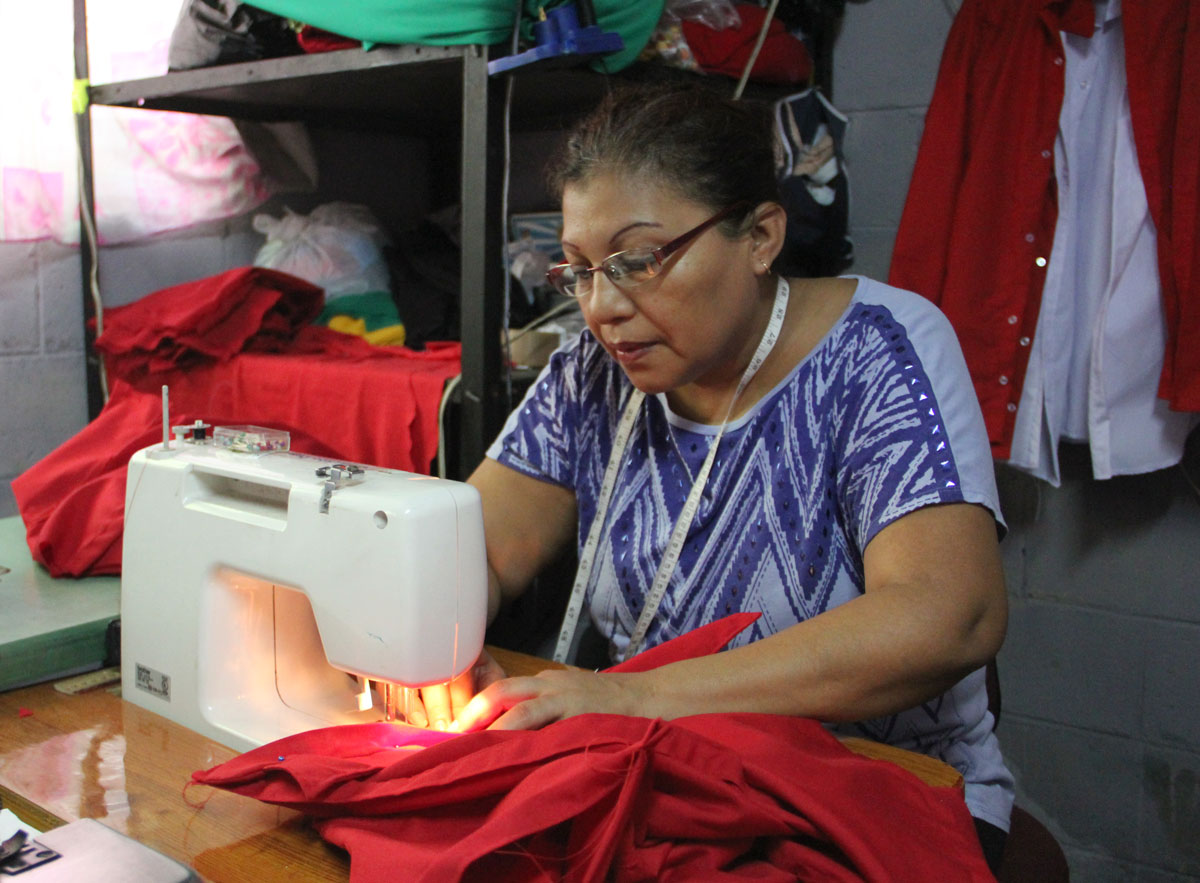Advertisement
Gang Violence Is Why Most Children Flee El Salvador, Survey Finds

Part 2 of a series on gang violence in El Salvador and those fleeing it to Massachusetts
In an eerily quiet neighborhood of Mejicanos in the late afternoon, while a nearby open-air market buzzes, a couple of truckloads of civilian police post the street with assault rifles as their inspector, Jorge Alberto Vasquez, gives me a tour of past murder scenes in what has been a running battle between the gangs MS-13 and 18th Street for control of the area.

He set only one condition for showing me the territory he and his men and women are trying to pacify: He wouldn’t take me unless I wore a bulletproof vest.
“They come to kill; it is a war,” Vasquez says.
If you are a woman, an adolescent or a child, you are more likely to die a violent death here in El Salvador than anywhere else in the world. If you’re a man, only next-door Honduras is more dangerous.
But because this "war" of gangs — against each other and the country itself — is not seen as a conventional "armed conflict," those who are leaving are generally not considered "refugees," at least not by the United States.
But make no mistake, says Fulbright Scholar Elizabeth Kennedy: They are fleeing.
“You have adolescents making very calculated risk analyses that their risks of staying in El Salvador are much higher than the risk on the journey,” Kennedy explains. She conducted interviews with 600 children who tried to get to the United States this summer, but were stopped short of the U.S.-Mexico border and sent back to El Salvador by Mexican police.
There are a number of reasons the children give for leaving, Kennedy says, including reunification with parents in America, getting schooling and finding work. But the predominant reason (given by 58 percent of her interview subjects) is escaping gang violence.
“They know they face kidnapping ... rape, maiming, forced labor, disappearance, murder on the migrant routes," she says. "But they feel that's a certainty if they stay in El Salvador.”
Noah Bullock, the executive director of Foundation Cristosal, an Episcopal human rights organization in El Salvador, says the violence forces 130,000 Salvadorans to relocate to somewhere else in the country every year. And as many as a third of them have to move a second time within the year, Bullock says, to find a location far enough away from their old home so that no one might recognize them and report back to the gangs.
Advertisement
“Rape is a tool for fear, extortion, murder, forced disappearances … this is systematic human rights violations,” Bullock says. “If we were to recognize that situation, the U.S. and the international community has the obligation to recognize the rights of victims of this conflict to international protections.”
Most Salvadorans can't get away from the fear and news accounts and the crime itself. In daily conversation you hear constant talk of “pandillas," or gangs, and “pandilleros," or gang members. Salvadorans know the gangs by name: Mara Salvatrucha, or MS-13, Barrio 18, or 18th Street, Maquina, Mau-Mau, Surenos and Revolucionarios, for instance. The two biggest are called “MS” (“emmay essay”) and “18” (“dieciocho”) for short. Their graffiti is everywhere.

Widespread Extortion
Even when gang warfare does not affect Salvadorans directly, extortion does. It's as if gangs are holding the whole country up by its ankles until the change falls out of its pockets. By one estimate, 80 percent of small businesses are shaken down. Every Salvadoran seems to have a story.
Take Marcello, the driver we hired in San Salvador, a well-experienced navigator in the troubled areas off the tourist routes. He says the company he's associated with got a recent call from the 18th Street gang after one of its taxis went missing.
“'You know what?’ ” said the caller, according to Marcello. “'If you don't give me this amount of money, we're going to burn the car down.' ”
The owner of the company paid what the gang wanted. But the next day, 18 stole another cab. This time the owner was feeling pressed. “He said, ‘I can't pay you for the cab right now because I don't have the money,' ” Marcello recounts.
The gang showed no sympathy. Indeed, it demanded $1,000 a month in “rent" and, to make its point, “they kidnapped two of the drivers,” Marcello says.
“And one of the pandilleros told them, ‘You better tell your boss that this is the last warning we're going to give. I don't have any problems killing you both right now to show him we're not joking. So he better start paying or otherwise we will start killing everyone.’ ”
As punctuation to Marcello's story, a newspaper story the next day reported a similar case, involving a gang attack on a minibus. Assailants had forced the passengers off the bus before shooting it up, which was a display of restraint compared to an earlier attack, when the gang shot a bus up with the passengers still inside, killing two of them.
Gangs even use the phonebook to extort people by cold calls. More chilling than that, the gangs are going after the critically important remittances Salvadorans send back home to their families from the United States. According to World Bank data, remittances account for some 17 percent of El Salvador’s gross national product.
“The gangs are able to get their hands on lists from transfer companies, like Western Union,” says Fulbright Scholar Kennedy. “They put a gun to the head of the small store owner and say, ‘Give me the list or I’ll shoot you.' That means they got the address of everyone based in the U.S. and the address of everyone based in El Salvador: where they live and how often they get money and how much money they get.”
Alleged Police Abuse
In response to the gangs, the police have launched one crime-fighting offensive after another, invoking the language of scorched earth warfare — the sort inflicted with so much brutality during the nation's civil war, which lasted until the 1990s. First came operation "Iron fist," followed by "mano dura" — "hard hand” — and after that one failed "super mano dura."
The No. 2 man in the National Civil Police of El Salvador rejects them all.
"No, it doesn't work for us. No, no, no, no,” says Howard Cotto, the civil police sub-director. “I'm sure that's not a good solution to solve the problems.”
The young and energetic Cotto says part of the solution must involve "community policing," a familiar approach in Boston and other American big cities, where cops walk neighborhood beats and are encouraged to treat the community as a partner in solving crime.
But Cotto and police reform in El Salvador run up against a long history of police repression, corruption and public distrust. News accounts, as well as people we interviewed, allege that cops have given gangs the identity of witnesses to crimes and the identity of victims who have come forward to police. And though Cotto claims that maybe 30 percent of the crimes are “solved,” in the sense that police know who committed them, by one estimate no more than 2 percent of murders ever lead to anyone ever being convicted and sentenced.

The police are no better than the gangs, some people complain.
“The biggest problem in this community next to poverty is police abuse,” says Maria Luz Panameno, a seamstress, labor organizer and leader in her local community of La Selva in Ilopango. “[The police] are abusing their authority. And we have seen atrocities. We’ve seen them put guns into kids’ mouths and put guns against their heads just like in times of war."
She shows me her son's U.S. college diplomas. Some are on the wall along with an image of Jesus next to a photo of Che Guevara. Her son is studying in California for his master’s degree in English. The boy next door is about to become a lawyer, she says, and she is working on a dress that a neighborhood girl will wear in the local beauty pageant.
"There aren’t just criminals who live in this community," she says with emphasis.
Yet children here in El Salvador are increasingly both targets and actors in the violence.
Celia Cedrano, of Foundation Cristosal, has a long history advocating for human rights in El Salvador. At the age of 23, she became head of the non-government Human Rights Commission after all its other leaders were murdered in one night during the brutal civil war.
“You see structural violence. You also see social violence,” she says. “It is very hard to differentiate between these gang members as victims or victimizers.”
Which makes simple crime-fighting strategies unlikely to succeed and requires more complicated solutions that go well beyond the police. In the meantime, the urge to escape pushes more people northward.
